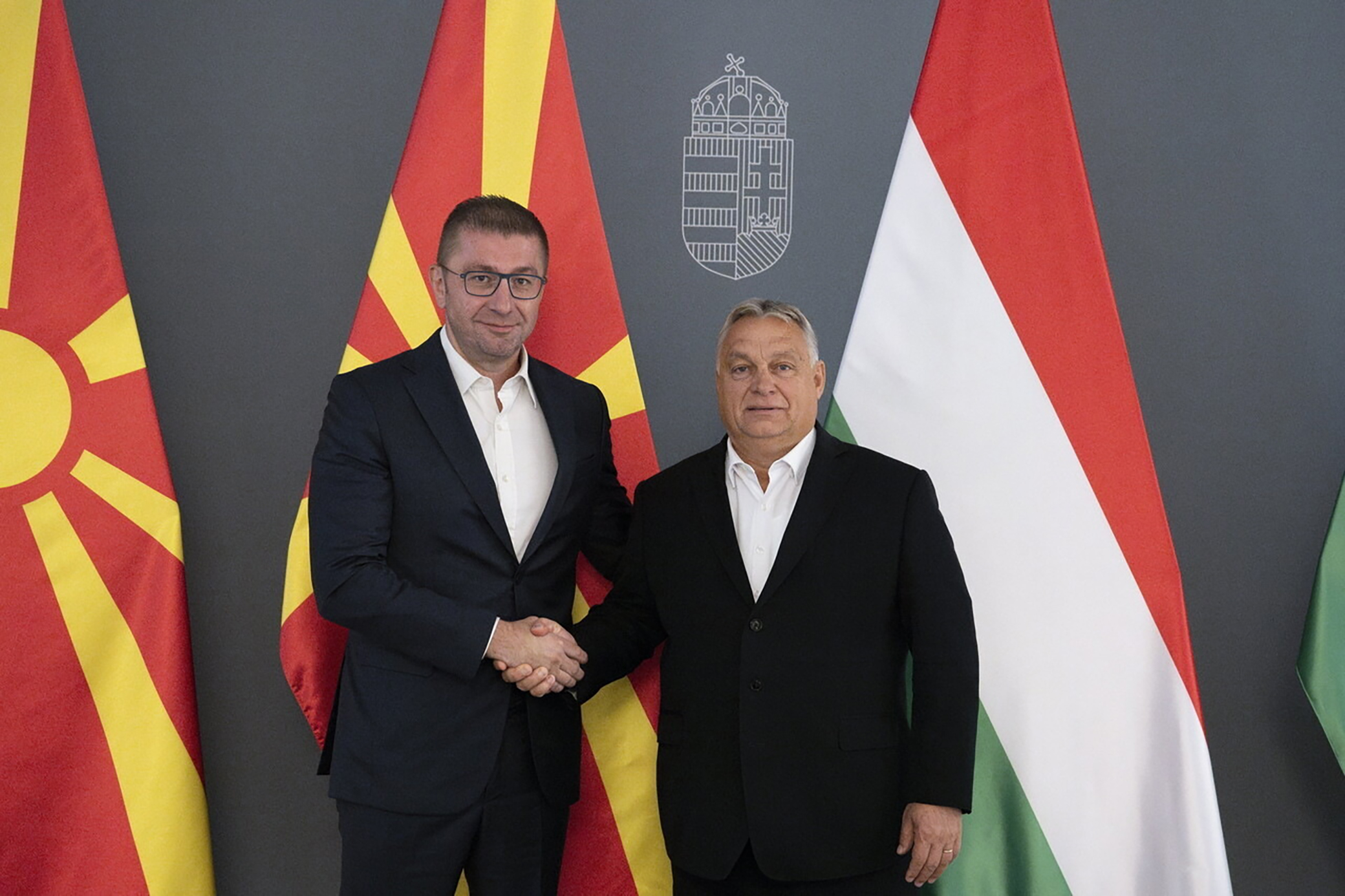After the duo of presidential and parliamentary elections in North Macedonia, the country is entering an era of change. The change of power will lead to conceptual shifts in foreign and domestic policy, important not only for the future of the country, but that of the entire region … and beyond.
SDSM defeat
During the election runoff on May 8, the incumbent President of North Macedonia, Stevo Pendarovski, who was supported by the ruling SDSM (Social Democratic Union of Macedonia), lost to Gordana Siljanovska-Davkova, who was nominated by opposition’s VMRO-DPMNE (Internal Macedonian Revolutionary Organization – Democratic Party for Macedonian National Unity). That was, in fact, a crushing defeat as Pendarovsky scored only 29% while Siljanovska-Davkova gained 65% of the votes.
A similar rout occurred in the parliamentary elections – the coalition led by VMRO-DPMNE was supported by 43% of voters who took part in the voting. Accordingly, the party and its allies will receive 58 mandates out of 120 in the new parliament. SDSM figures – 15% and 18 seats in the parliament.
The results of SDSM’s Albanian ally, the European Front bloc (founded based on a member of the ruling coalition, the Albanian Democratic Union for Integration, DUI) turned out to be better, with 19 mandates sealed. But this political force will have to go into opposition anyway because VMRO-DPMNE has already invited DUI’s opponents – the coalition of opposition Albanian parties VLEN (VREDI) with 13 deputies in parliament – to become part of the government majority.
Thanks to a government coalition involving both Macedonians and Albanians, a total change of power in Skopje will not lead to a renewal of the long-settled Macedonian-Albanian conflict. However, it seems that in the near future, this island of stability will be the exception rather than the rule.
Macedonia, just Macedonia
First of all, troubled times are expected for North Macedonia’s relations with neighboring countries – Bulgaria and Greece.
The conflict with Greece has, in fact, already begun.
As is known, VMRO-DPMNE has been a categorical opponent of changing the name of the state by adding the word “North” to it. Even if the new president, parliament, and government do not initiate withdrawal from the Prespa Agreement, they are apparently going to de facto refuse to implement or ignore the agreement altogether.
Such a policy is already being implemented –VMRO-DPMNE’s Gordana Siljanovska Davkova took the oath as president of the country, which she referred to as “Macedonia”, despite the fact that the text of the oath fixed the name as “North Macedonia”. The Ambassador of Greece to North Macedonia, who was invited to the parliament session for the president’s inauguration, left the hall in an act of protest.
Obviously, these are only the “first bells” of complications in relations between Skopje and Athens.
If we consider that only thanks to the agreement on renaming the country was North Macedonia able to get rid of the Greece veto and become a member of NATO, the dispute between the two Balkan neighbors will not only contribute to the instability in the region, but may affect unity of the entire Western military bloc.
On the Bulgarian side, the dispute related to the issues of Bulgarian and Macedonian history and Macedonian identity will ultimately turn chronic. VMRO-DPMNE has repeatedly emphasized that it is not going to make concessions to Sofia, even for the sake of unblocking the European integration process, and apparently, it is going to follow up on its promises.
One of these fundamental points is the refusal to pass amendments to the Constitution of North Macedonia that would declare Bulgarians a nation-building ethnic group. Despite the fact that the member of the future ruling coalition, the Albanian bloc VLEN/VREDI, for various reasons did not oppose rewriting the preamble to the Constitution at Bulgaria’s request, VMRO-DPMNE has enough votes to prevent constitutional changes.
The unresolved dispute between Bulgaria and North Macedonia will have a negative impact on the region and, again, on the atmosphere within NATO, of which both countries are members.
But the main consequence of the uncompromising position of the new government will be the suspension of the country’s accession to the EU for an indefinite period of time.
It should be noted that VMRO-DPMNE does not formally snub the country’s EU path. Moreover, the new government coalition VRMO-DPMNE and VLEN/VREDI decided that “European integration, economic development, rule of law and fight against crime and corruption will be the main principles of the new government’s work”, as per a joint communique issued after meeting of party leaders in Skopje on May 11.
That is, VMRO-DPMNE assures the public it will be able to launch negotiations on joining the European Union without painful compromises for Macedonian patriots, although there are currently no options that will ensure North Macedonia’s progress on the way to the EU without concessions from Bulgaria.
Orbán’s triumph
The conclusions stated above are obvious, there was a lot of talk about it even before the elections. The only thing that changed after the vote was the understanding of how many residents of North Macedonia did not want and do not want Euro-Atlantic and European integration at any price. Therefore, after May 8, the country’s new uncompromising course looks more stable and long-term.
However, there are conclusions that are usually talked about less, but they are no less significant for the Western Balkans and for the whole of Europe.
It is about the triumph of Viktor Orbán.
Everyone knows about the close connection between Hungary’s leader and VMRO-DPMNE. Suffice it to mention that in 2018, the former leader of VMRO-DPMNE and Macedonian ex-prime minister Nikola Gruevski escaped corruption charges after being granted an asylum in Hungary with the direct assistance from Orbán.
The power reshuffle in Skopje will, first of all, mean that Orbán has gained an ally within NATO who, in theory, can support Budapest’s position on all, or at least most, issues. For example, this actor might share Hungary’s skepticism regarding military aid to Ukraine.
However, Macedonians have a special relationship with Ukrainians, which is based on the cooperation between Skopje and Kyiv during the armed conflict in Macedonia in the early 2000s. But, in the end, as the ancient Greeks said, “πάντα ρεῖ καὶ οὐδὲν μένει” – everything flows, everything changes.
The main threat
Another consequence of Hungarian-Macedonian friendship may be, as strange as it sounds, an attempt to “reboot” the European integration process of North Macedonia.
In the second half of this year, Hungary will chair the Council of the European Union. Hungarian government officials have repeatedly stressed that during the EU presidency, the Hungarian government will do everything possible to speed up the accession of the Western Balkans, including North Macedonia.
The new Macedonian government can hope that the support from Budapest will help remove the issue of Bulgaria’s veto. However, there is currently no indication that Budapest will be able to force Sofia to drop its demands toward Skopje.
What will happen if the option of “uncompromising European integration” turns out to be hollow?
First, it will mean that North Macedonia (or Macedonia?) will find itself stuck with the status of a candidate for joining the EU for years to come. Secondly, Macedonians may become fully frustrated over the European vector of the country’s development.
And that’s when other geopolitical actors will join the game.
Representatives from the former North Macedonia government emphasized during the election campaign: less EU and the West in the region equals more Russia and the East, including China. If we recall that Budapest is one of Bejing’s few partners in Europe and the most loyal nation (among the EU and NATO member states) to Moscow, we can see that the threat of a geopolitical reversal of North Macedonia is really out there. And this, in fact, is the biggest risk for the country and region as a result of the post-election political shifts in the former Yugoslav Republic of Macedonia.



